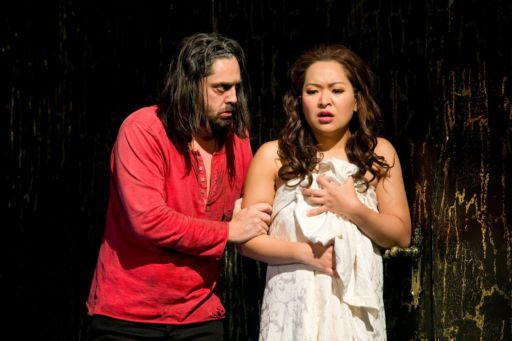Leipzig, Opernhaus, Stagione Lirica 2012/2013
“RIGOLETTO”
Melodramma in tre atti su libretto di Francesco Maria Piave dal dramma Le roi s’amuse di Victor Hugo
Musica di Giuseppe Verdi
Il Duca LEONARDO CAPALBO
Rigoletto VITTORIO VITELLI
Gilda EUN YEE YOU
Sparafucile JAMES MOELLNHOFF
Maddalena KARIN LOVELIUS
Giovanna CAROLIN MASUR
Conte di Monterone JURGEN KURTH
Marullo SEBASTIAN WARTIG*
Matteo Borsa VIKTOR SAWELY
Conte di Ceprano SEJONG CHANG
Contessa di Ceprano ANAT EDRI*
Un usciere di corte FRANK WERNSTEDT
Un paggio OLENA TOKAR
Gewandhausorchester
Coro maschile Oper Leipzig
* Allievi della Hoschule fur Musik un Theater “F.Mendelssohn Bartholdy” Leipzig.
Direttore Matthias Foremny
Maestro del Coro Alessandro Zuppardo
Regia Anthony Pilavachi
Scene e costumi Tatjana Ivschina
Lipsia, 13 ottobre 2012
Leipzig’s first production of the new season, Rigoletto, had the Good, the Bad, and in contrast with so much German Regietheater, only a little bit of the Ugly. Directed by prize winning Anthony Pilivachi, the evocative production managed to bring Verdi’s dark melodrama to fruition despite substandard musical and vocal performances by all except the title character. Pilivaki managed a deft combination of large picture combined with detail and striking images, as well as a final scene contrasting the Duca’s frivolous eroticism with both Maddalena and Gilda’s tragic attraction to his charm. which along with the superior Rigoletto of Vittorio Vitelli brought this signature middle work of Verdi to life for the Leipzig public. Spatial relationship and physical gesture delineated the drama rather than character development and expression, and of the singers, only Vitelli’s Rigoletto had any depth or life. In the Regietheater spirit of ‘Wiederspruch’, or emphasis by the opposite, Pilavachi and his designer Tatjana Ivschina simplified the Duca di Mantova’s sumptuously decadent digs, while making Rigoletto and Gilda’s ‘remota..dimora‘ a stage filling, multilayered, darkly detailed set reminiscent of Zefferelli’s Metropolitan La Bohéme. This proved effective but reduced the Duca’s show of charm and power mostly to leaping on and off his white tablecloth bedecked bare banquet table. Ivschina’s neutral dark costumes subtly highlighted the protagonists brighter garb.
The marvelous Gewandhaus Orchestra which can play like a BMW sedan, seemed more like an old Skoda under Maestro Matthias Foremny’s direction, always in the wrong gear, lurching to match cadenzas, showing neither grace, controlled power nor elegance. An orchestra which played the most sumptuously elegant minuetto as the Duca seduces the Contessa di Ceprano and a heart rending cello obligato in Rigoletto’s ‘Ah, miei signori pietá, perdono‘ cannot be faulted for such and unmusical and clumsy evening.
Both Gilda (Eun Yee You) and the Duca di Mantova (Leonardo Capalbo), while young, agile and attractive, seldom exceeded the standards of finalists in an international singing competition. Inconsistent and artificial vocalism barely fulfilled the basic demands of their roles, resulting in sometimes unattractive and inconsistent high notes, lack of phrasing or line and often in Gilda’s case, inaudibility as a substitute for nuance. Nonetheless many cuts were opened and cadenzas added, perhaps to give the singers a second chance to get it right. The conductor could not have been a help, and the tenor and baritone clearly struggled with inflexible, unsuitable tempi. Vitelli, who pulled off a very fine ‘Cortigiani‘ did not have enough voice for ‘Si vendetta’, especially in the face of the crude racket Foremny allowed at the end. Vitini nonetheless created an often moving Rigoletto with his vocal coloring of the text and effective high notes.
Except for the Duca and Rigoletto all roles were cast from members of the Leipzig ensemble. The full voiced but sometimes uneven Sparafucile of James Moellenhoff cut a good figure onstage and was vocally more effective in his first meeting with Rigoletto. The statuesque Maddelena of Karin Lovelius, smoothly produced and strongest in the lower register, provided the perfect foil for the clownish staging of the famous Quartet (Bella figlia dell’amore). Both Viktor Sawaly as Borsa and Sebastian Wartig as Marullo showed attractive voices and good style. With the exception of Jürgen Kurth’s shaky Monterone, all the ensemble based comprimari did well and Carolin Masur was a particularly effective Giovanna. The Men’s Chorus delivered an excellent ‘Zitti, zitti‘ but stage-pit coordination was a major problem for all parties in Act one. Despite generally tepid applause for some of opera’s greatest hits, this production was enthusiastically received at the end. It will be fascinating to see how it holds up, especially if it gets the music making and singing the opera deserves.
Leipzig, Opernhaus:”Rigoletto”
